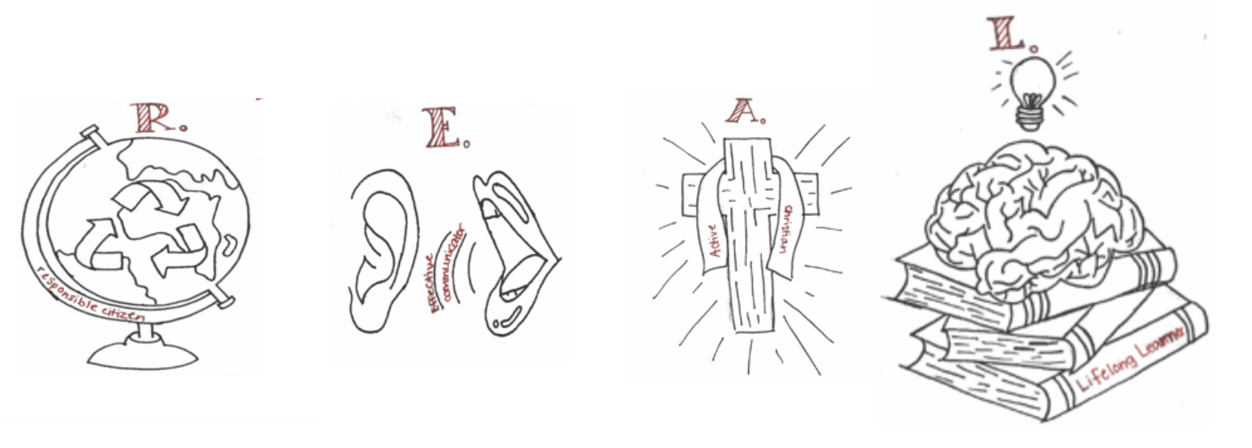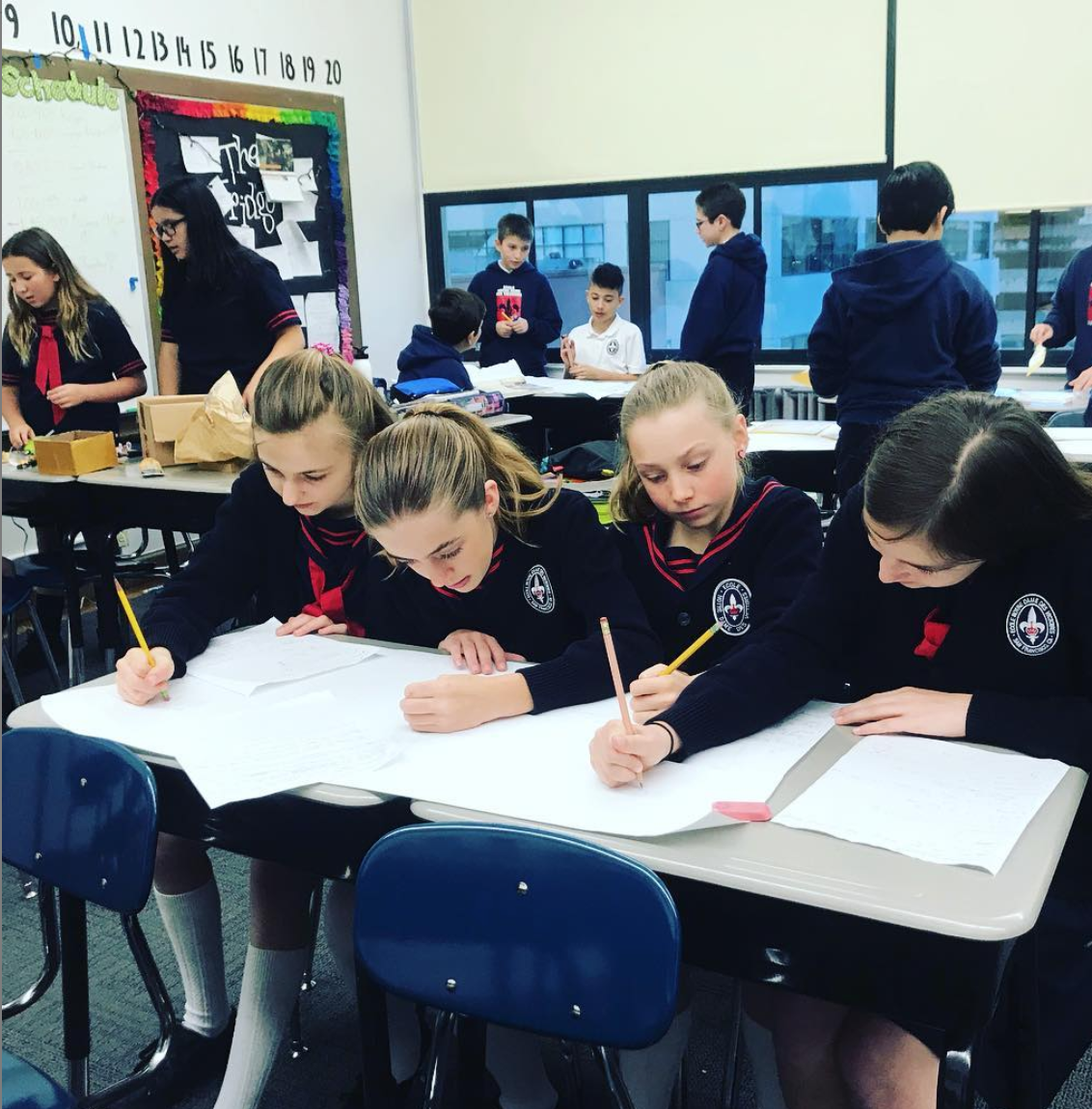
Grades 6, 7 and 8 are departmentalized with students receiving instruction from specialized teachers in reading and language arts, mathematics, science, upper level French, religion, social studies, computer, the fine arts which include formal art instruction, drama and music, and Physical Education. Subjects are integrated to the extent possible through cross-curricular instruction.
Learn more about the different aspects of the Middle School experience at École Notre Dame des Victoires.

Art
The weekly art classes focuses on famous artists and their works. In addition to learning drawing, watercolor painting, abstract and pastel techniques, the students learn photography, stenciling, paper cutting, printmaking, draw self-portraits and create clay sculpture pieces which are fired in the school kiln. Students study artists such as Georgia O’Keefe, Claude Monet, Jackson Pollack, Frida Kahlo, Viola Frey, Keith Haring, and Sean Sully.
Drama
A professional theater director works with the eighth-grade students to encourage and develop their acting, singing, and dancing skills. The year culminates in a full-length musical production. Recent musicals include Peter Pan, Fame, Jr., Beauty and the Beast, Jr., and Annie, Jr
Community Service
The entire student body supports other outside organizations throughout the year with activities such as the Missionary Children’s Association through Catholic Relief Services, SF Food Bank, the Red Cross, and the Canned Food Drive sponsored by CJSF, the Operation Rice Bowl Project at Lent, and the missions and outreach services of the Marists and the Sisters of St. Joseph of Orange through the Mission Carnival.
French Language and Culture
The program includes daily instruction by native French speakers. Grammar and conversation are integral to the program and major goals include developing a proper accent and fluid speaking ability. Reading, writing, conversation, listening and comprehension, cultural events and games are part of the learning experience. Literature, technology, field trips and projects are also incorporated to support new concepts and ideas.
The middle school curriculum includes work on various long-term group projects about French civilization and culture, which the students present to the class in French.
History/Social Science
The middle school history/social science curriculum focuses on ancient civilizations in grade 6, world history in grade 7 and U.S. history and government in grade 8. Project-based learning is integral to the program whereby students analyze, compare and contrast the similarities, differences, and connections among divergent cultures. Small group work and student presentations allow students to acquire knowledge and share their understanding of concepts studied. In addition to field trips to nearby museums and exhibits, guest speakers enrich the students’ learning experiences.
Literature
Comprehension, character development, appreciation for settings, foreshadowing and narrative prediction are elements of the learning program in literature. Literature circles are an integral aspect of the learning program, promoting a deeper and richer appreciation for specific selections. Students take responsibility for leading small group discussions, where they are called to substantiate their responses and shared observations. Vocabulary development is integral to the literature program and students are read to on a daily basis.
Mathematics
The middle school Math curriculum follows the California Common Core Standards. In 6th and 7th Grade, the students use Eureka Math by Great Minds and focus on building strong problem-solving skills and foundations for Algebra. Topics include Ratios, Proportional Relationships, Operations with Rational Numbers, Expressions, Equations, Area, Volume, Surface Area, Statistics, and Probability. In 8th Grade, the students move on to high school-level Algebra 1 and use Algebra 1 by Houghton Mifflin Harcourt, allowing them the opportunity to test out of Algebra 1 as a Freshman. All grades practice a Growth Mindset as they work towards mastering the curriculum learning goals. Instruction is data-driven using several data points, including the adaptive STAR Renaissance Math Assessment that is taken four times per year. Online tools used in class include Aleks, Khan Academy, Kahoot!, Quizziz, Quizlet, Desmos, and Google Classroom.
Outdoor Education
Hands-on exploration brings the study of scientific concepts to life. Physical science includes activities related to forms of matter, different forms of energy and patterns of change in our world. Children study the push-and-pull of magnets, the basic principles of sound and light, and that weather conditions change and can be measured. Earth science includes concepts that reveal that matter can be observed and classified and that there are observable changes on earth related to the study of rocks, crystals, water, volcanoes, earthquakes and general landforms. Life science study reflects that living things have observable characteristics that make them different from non-living things. This includes learning about the five senses, plants and animals, the caterpillar to butterfly life cycle, insects, dinosaurs and animal classification and their living habitats. Students also learn to celebrate the wonder of God’s creation.
Physical Education
NDV values the need for children to run and jump and play. Physical education classes are taught on a weekly basis in the school gymnasium by a credentialed instructor whose lengthy tenure has produced an impressive learning program for our children. Many NDV athletes have gone on to be successful in competitive sports at the high school level. Each PE session opens with a period of exercise and several invigorating laps around the upper level or lower track. Skills needed for specific sports are taught and team play is organized. Physical fitness and nutrition are important elements of the program. Participation in cross country and track events sponsored by Catholic Charities Catholic Youth Organization (CCCYO) is strongly encouraged.
NDV celebrates its teams in basketball, volleyball and soccer. Parents are deeply involved as team coaches or organizers for each grade. Beginning in grade three, teams compete through the CCCYO. In grades K-2, parents can organize teams through other city leagues such as the Viking League.
Religion
Daily, formal religious instruction is an integral part of the students’ education program. The students learn about the traditions and the liturgical seasons of the Catholic Church. Formal prayers are taught and all students create original prayers. All grades attend monthly school Masses. Students learn about various Bible stories and in second grade learn, in greater depth, about the sacraments of Reconciliation and Eucharist. Formal reception of these two sacraments takes place in the second grade year. Daily prayer experiences are planned throughout the school year, and a Marist priest visits each class twice per month to provide additional background in the Catholic faith. Family Life instruction is integrated into the religion program as well.
Science
The science curriculum in grade six emphasizes the study of earth sciences. The standards in grade six present many of the foundations of geology and geophysics including plate tectonics and earth structure, topography, and energy. The material is linked to resource management and ecology, building on what students have learned in previous grades. The students participate in a week-long outdoor education trip to Yosemite National Park. Following the scientific method of inquiry, students participate in weekly, hands-on lab experiments and explorations and include Lab write-ups.
The science curriculum in grade seven focuses on the study of life sciences including systems of the human body, genetics, ecosystems, plant life and evolution. Following the scientific method of inquiry, students participate in weekly, hands-on lab experiments and explorations. Lab write-ups are integral to the science program.
Students in grade eight study topics in physical sciences such as motion, forces, and the structure of matter, by using a quantitative, mathematically based approach similar to the procedures they will use in high school. Earth, the solar system, chemical reactions, the chemistry of biological processes, the periodic table, and density and buoyancy are also included in the curriculum. Students will begin to grasp four concepts that help to unify physical sciences: force and energy; the laws of conservation; atoms, molecules, and the atomic theory; and kinetic theory. Following the scientific method of inquiry, students participate in weekly, hands-on lab experiments and explorations and include Lab write-ups.
Storytelling
Seventh graders work with a professional storyteller to learn storytelling techniques that help them bring to life children’s classics, which they memorize and share with the primary grade students.
Student Success Team
At NDV we use the Student Success Team to help our students have a successful school experience. The Student Success Team is comprised of the student’s teachers, counselor, vice principal, principal and parents. The vice principal acts as the facilitator and note taker. Our purpose is to support our students’ academic, spiritual, social, and emotional well-being. Having the student’s teachers and his/her parents together provides us with a more complete picture of the student.
When a parent or teacher feels a student would benefit from an SST meeting, a Student Referral Form is initiated by the student’s teacher to begin the process. The form indicates areas of strength, areas of concern and interventions which have been used with the student. The parents also complete a Parent Preparation Form indicating the student’s strengths, the parents’ concerns, what motivates the student, and the parents’ goals and expectations for the student.
At the SST meeting, we develop an Action Plan to help the student become more successful at NDV. The Action Plan might include interventions such as, working with teachers after school, working with a tutor, monitoring of the student’s planner, and/or a request for a psycho-educational assessment to see how the student learns. The vice principal will summarize the SST meeting articulating the agreed upon interventions intended to assist the child in becoming a successful learner. Each participant will receive a written copy of the Action Plan.
Response to Intervention (RTI) forms will be part of the student’s report card. The RTI will list the interventions and the student’s progress using each intervention. Follow up meetings will be held if deemed necessary.
If, as part of your child’s action plan, he/she is permitted to use an e-Reader, laptop/tablet, iPad or other electronic device, please complete a BYOD User Agreement 2018-19.
Summer School
NDV offers a two-week English, French, math, and study skills summer program taught by the Middle School Teachers. The program is open to all current NDV students entering 6th, 7th, and 8th grades, and is held during the two weeks before school starts. Students may enroll in as many as 4 classes, each one hour in length.
Technology
The technology curriculum in middle school emphasizes Digital Citizenship, 21st Century and STEAM skills. The students have access to resources in the computer lab including laptops, engineering robotics kits and a 3D printer. Following the Engineering Design Process students participate in hands-on exploration of robotics and coding. Online tools and software used in class include: Common Sense Media, Google Apps for Education, MIT Scratch, Code.org, LEGO Spike Prime, Tinkercad and Canva for Education.

Contact NDV School
École Notre Dame des Victoires
659 Pine Street
San Francisco, CA 94108
ph 415.421.0069
office@ndvsf.org
Contact NDV Church
Église Notre Dame des Victoires
566 Bush Street
San Francisco, CA 94108
ph 415.397.0113
ndvsf.org
More Information
NDV is a member of the Western Association of Schools and Colleges, the Western Catholic Educational Association, the CSJ Educational Network, and the Society of Mary.


